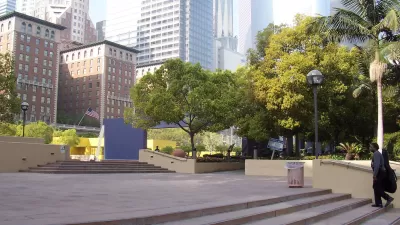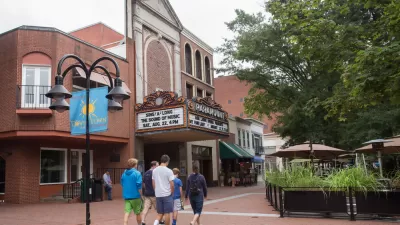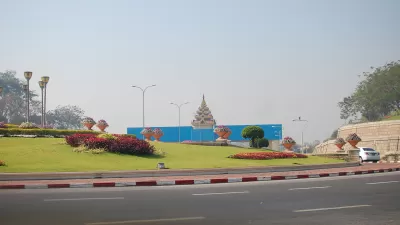Freeway overpasses instead of town squares are now often selected as the preferred public space to promote a non-commercial point of view, but such messaging does little to enhance public discourse, writes planner and urbanist Howard Blackson.
Towns used to be built around public squares, which became the center and podium for all manner of public discourse. Later, buildings came first and public space became an after-thought. Worse yet, now freeway overpasses rather than public squares or plazas are often selected as the place to protest and pontificate about a political or social belief. Planner, urbanist, and Leon Krier disciple, Howard Blackson writes about this less obvious loss to an auto-oriented lifestyle:
Our failure to cultivate the value and quality of our public spaces and public life is found in this picture of protesters and political advocates on a freeway overpass. Our cities are made up of public buildings, streets, squares and private lots, blocks and buildings. But when people want to be heard, seen, and get their message out to as many people as possible, they now gather on freeway bridge overpasses… for its on the freeways where everyone else can be found today, and not on our public street corners and squares.
Blackson goes on to point out how freeway overpasses are not the equals of urban public spaces:
When I see people expressing their views on freeway overpasses, I see our civilization under duress or at least in transition – from gathering in the square to holding signs on an overpass bridge. These are one-way statements and this type of conversation does not facilitate a dialog and understanding. Sadly, this illustrates how far we’ve receded from what urban design guru Leon Krier teaches, “The architecture of the city and public space is a matter of common concern to the same degree as laws and language – they are the foundation of civility and civilization.”
For more of Blackson's thoughts on this topic, see the source article.
FULL STORY: Overpassing the value of public space

Alabama: Trump Terminates Settlements for Black Communities Harmed By Raw Sewage
Trump deemed the landmark civil rights agreement “illegal DEI and environmental justice policy.”

Planetizen Federal Action Tracker
A weekly monitor of how Trump’s orders and actions are impacting planners and planning in America.

Why Should We Subsidize Public Transportation?
Many public transit agencies face financial stress due to rising costs, declining fare revenue, and declining subsidies. Transit advocates must provide a strong business case for increasing public transit funding.

Understanding Road Diets
An explainer from Momentum highlights the advantages of reducing vehicle lanes in favor of more bike, transit, and pedestrian infrastructure.

New California Law Regulates Warehouse Pollution
A new law tightens building and emissions regulations for large distribution warehouses to mitigate air pollution and traffic in surrounding communities.

Phoenix Announces Opening Date for Light Rail Extension
The South Central extension will connect South Phoenix to downtown and other major hubs starting on June 7.
Urban Design for Planners 1: Software Tools
This six-course series explores essential urban design concepts using open source software and equips planners with the tools they need to participate fully in the urban design process.
Planning for Universal Design
Learn the tools for implementing Universal Design in planning regulations.
Caltrans
Smith Gee Studio
Institute for Housing and Urban Development Studies (IHS)
City of Grandview
Harvard GSD Executive Education
Toledo-Lucas County Plan Commissions
Salt Lake City
NYU Wagner Graduate School of Public Service





























